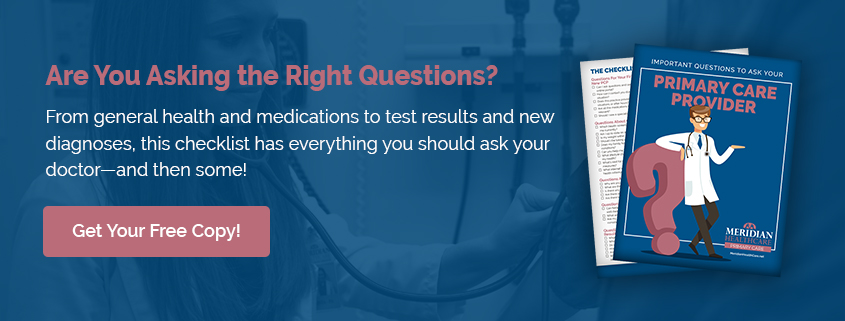You and Your Doctor: Important Discussions To Have At Your Next Appointment
Having a good relationship with your primary care doctor is crucial to maintaining your overall health and well-being. From vaccinations to preventative care, it’s important that you and your physician are on the same page about how to best approach your healthcare.
Luckily, it’s never been easier for patients and doctors to become better partners in care. Here are some questions you should ask at your next appointment (whether or not you’re concerned about a medical problem) to make the most of your doctor visit.
[FREE CHECKLIST] Download a printable version of our Important Questions to Ask Your PCP Checklist!
Are There Any Recommended Vaccinations?
For the average person, the answer is probably just a yearly flu vaccine. But, if you’re traveling somewhere outside the country or work in an area where you’ll be exposed to communicable diseases, talk to your doctor about the options that are out there. Some illnesses can be life-threatening, and others can be prevented altogether through vaccination.
There are also health conditions that make some people more vulnerable to certain diseases. If you have one of these conditions – such as diabetes or kidney disease – you might need a special type of vaccination. And sometimes a doctor will recommend vaccines for family members and loved ones who live with you, too (like young children).
Are There Any Tests I Should Have Performed?
If you’re experiencing symptoms that are new or unusual, it’s important to talk to your doctor about them. This includes symptoms of a disease that may be caused by something other than the original diagnosis. If you have a family history of certain conditions and/or an unusual pattern of diseases in your family, you can have testing done to look for those conditions. This can include mental health issues, as well.
Additionally, people with chronic conditions like high blood pressure or allergies should discuss their treatment plan at every visit. New or additional tests may become available and can reduce risk factors while improving health overall.
What Are My Options For Treating or Managing a Condition?
As you seek treatment for an illness (or to manage symptoms), it’s important to be an informed consumer. You might have to make decisions about what treatments are right for you and your situation.
That’s why it’s important to ask the right questions of your doctor and other healthcare providers so that they can guide you through the process of getting better. These conversations can be difficult, but they’re worth having – they can help you manage your disease or illness more effectively.
Here are some useful questions:
- What are my options for treating this condition? Or for managing these symptoms?
- What are the risks and benefits associated with each option? Which one is most likely to work well with my lifestyle?
- What side effects should I expect from this medication or procedure? Are there alternatives that might work better with fewer side effects? If so, how do those alternatives compare to one another or against doing nothing at all (“watchful waiting”)?
How Can I Make Sure That We’re On the Same Page About My Health and Wellness?
You and your doctor are a healthcare team working for your benefit. Make sure that your concerns are understood and that you fully understand the diagnoses (and advice being given to you).
- Keep a list of questions and concerns that you want to ask your doctor.
- If you don’t understand what the doctor tells you, ask them to simplify it.
- Make sure your doctor knows your medical history, family history, lifestyle, and goals.
- Make sure your doctor knows what insurance coverage you have.
How Is My Current Care Helping Me, and How Can It Be Improved?
When you have a conversation with your doctor about how you can improve your current care, it’s important to keep it positive. Even if your provider doesn’t have any additional ideas for treatment (other than suggesting a second opinion), they may be able to point out things that make the process more effective.
Your visit isn’t just an exchange of information – it’s also an opportunity to obtain feedback on the way the practice runs. If something isn’t working, an open line of communication may be the ticket to correcting an issue or concern.
What Else Should I Consider as Part of My Healthcare Routine?
Your doctor is the second most important individual involved in your healthcare (after you, of course). He or she can take into account your age, health history, and overall condition when advising you of any other concerns as you get older.
If you have a family history of cancer, for example, your doctor might recommend that you undergo certain screenings sooner than others. If you have a history of chronic conditions, your doctor will give you their best advice on how to manage concerns as they develop. While chronic conditions may never get better, you and your doctor can work together to keep them from getting worse.
How Can I Get the Most Out of My Follow-Up Visits?
Your doctor may want to schedule a follow-up with you if there’s a specific health concern that’s being addressed.
- Ask about the next test.
- Ask about the next treatment plan.
- Ask about the next medicine or procedure (like an MRI or surgery).
- Find out when you will get your test results back from this visit so that you know what’s in store for you at your follow-up appointment (and so that you can prepare yourself).
When is My Next Doctor’s Appointment?
Asking this simple question will help to ease your mind, and allows you to plan for the weeks or months leading up to your next visit.
- When is the next time I should see you (or contact you between appointments)?
- What do I need to do before my next appointment?
- What if something comes up between now and then?
Creating a Strong Doctor-Patient Relationship
The doctor’s office exam room is a place of trust. It’s where you can go to ask questions, get answers, and learn more about your health. To ensure that you get the most out of these visits, and get proper medical care, here are some tips for creating a great relationship with your doctor:
- Be honest with your doctor. Be willing to answer questions openly so that you can get a proper diagnosis. This enables your doctor to make the best decisions about your treatment options and keep your medical records up-to-date.
- Write down all of your symptoms before visiting the office so that you don’t forget anything important.
- If there is something bothering you, let them know – it will help them determine if they need to take action right away or if it is something worth keeping an eye on.
Participate in Decision Making
Sometimes these types of conversations with your doctor can be difficult, but they’re important to ensure that you receive the best care possible. The more comfortable you are with your doctor, the easier asking these questions will be!
If you’re having a hard time getting answers, consider changing doctors or checking out another medical practice until you find one that’s right for you and your family.
The doctors and health services staff at Meridian HealthCare offer primary care services for adult and adolescent patients and pride themselves on having the compassion and expertise to guide you through a healthy life journey. Reach out today to learn more about how we work to treat the whole person for complete wellness!






